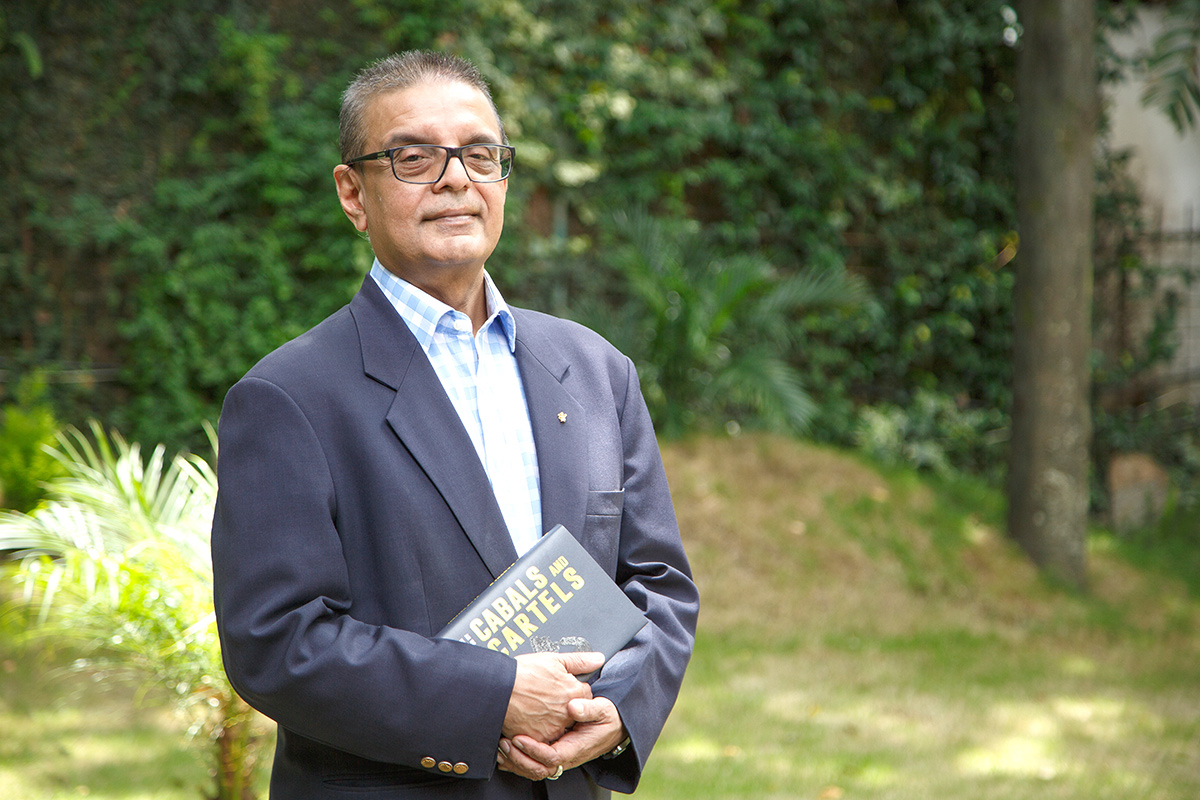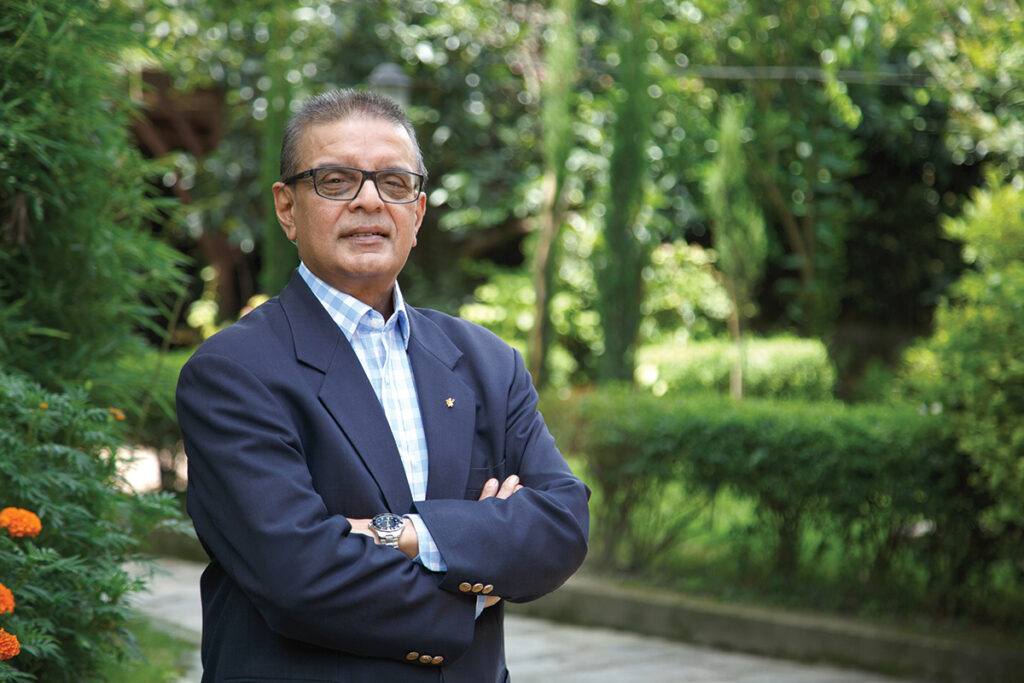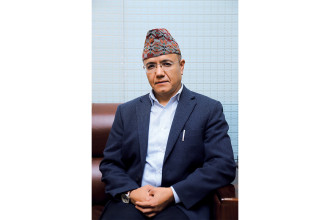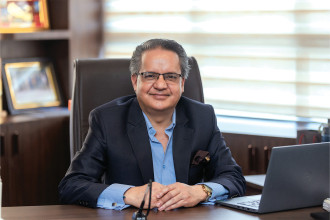
Rajib Upadhya is someone with a vivid career and an even more interesting life. Born in Kathmandu, Upadhya spent most of his early schooling years in New York and Bangkok, eventually coming back to Nepal and enrolling into Budhanilkantha School. Upadhya then went on to join Tribhuvan University and has also completed a handful of short summer-school and executive programs through the course of his career.
Upadhya started his professional career as a journalist and broadcaster with Nepal TV in 1988, then the only TV channel in the country. After a successful seven year run at Nepal TV, Upadhya transitioned to a position at the South Asia Region External Affairs Department of the World Bank where he dedicated over 23 years of his life, before voluntarily opting for an early retirement in September 2018. Since then Upadhya has rediscovered his love for writing and spent most of his time researching and writing for his debut novel, Cabals and Cartels: An up-close look at Nepal’s Turbulent Transition and Disrupted Development.
In this edition of B360, Upadhya discusses his views on leadership. Excerpts:

How would you define a leader?
The definition of a leader has obviously changed over the ages. But to me, a leader is still someone who personifies the public will. He or she instinctively connects with the popular aspiration for change. A good leader takes it upon himself or herself to keep that spirit alive by giving it a moral voice, an intellectual reason, and a vision. To me, the mark of a great leader is someone who makes this his or her life’s mission, be it in politics, the public service or in the professions.As a Senior External Affairs Officer for the World bank, what sort of leadership skills were you required to maintain?
The leadership style I most admired and tried to emulate during my career at the World Bank was that of leadership from behind. International organisations like the World Bank are multicultural. They bring together people of diverse social and professional backgrounds. It makes perfect sense to lead from behind because it fosters teamwork; it brings out the best in everyone.Does the definition of leadership carry a different meaning when working on an international platform in contrast to a domestic organisation?
International organisations such as the UN and the World Bank were set up after 1945, post-World War II, primarily to ensure that everyone henceforth played by the same rules. In that sense, they have a common mandate to provide global public goods like world peace and addressing global challenges like pandemics and public health emergencies, climate change and disaster recovery. Or in other cases, the issues could be international financial crises, humanitarian relief for refugees, or human rights abuses and even genocide. Therefore, people who work with organisations such as the UN and the World Bank are globally recognised as international civil servants. Now, translating this global mandate into national action across politically, socially and economically diverse societies is not easy. It takes extraordinary skill to navigate national laws; national institutions; local customs, traditions, beliefs and practices; and oftentimes, local politics and powerful political and commercial interests. Development professionals have a term for this combination of factors. They call it “governance”. I am not talking here just about countries like Nepal. Consider the US under the Trump Administration and how it is systematically delinking itself from the international order. Look at the UK, post-Brexit. Look at how democracies are under siege in many parts of the world today. And consider what the international order might look like post-COVID 19. Therefore, the leadership skills required of any international civil servant is doubly challenging today. The skill set of yesterday will certainly not serve tomorrow’s needs. A major overhaul is due.How do the skills that you refined in your career with the World bank and as a journalist translate into your writings?
My biggest assets have been my training in journalism. Over the years, this training heightened my sense of observation. It helped me to think critically. And it also taught me the value of objectivity. Over later years, my World Bank job conditioned me to focus on the big picture as opposed to being sucked into the day-to-day. I would like to believe that all of these attributes are reflected in my writings today.
Over the course of your career how have your values changed? What lessons did you learn along the way?
Let me put it this way – I belong to a generation of Nepalis that has seen it all: the Panchayat System and the first serious challenge it faced in 1985 which led to the national referendum; the 1990 Jana Andolan and the restoration of multiparty democracy; the perversions of multiparty democracy since 1994; the Maoist insurgency between 1995 and 2005; the Royal Palace massacre of 2001 and King Gyanendra’s subsequent adventurism; Jana Andolan 2, the fall of the monarchy, the signing of the Comprehensive Peace Agreement and developments since, including the two Constituent Assemblies, the great Gorkha earthquake of 2015 and the effects of the COVID 19 pandemic today. The generation I belong to has lived through each of these defining moments of contemporary Nepali history. We all have deep personal experiences associated with them. So, of course, my values and my outlook on life have changed over the years along with that of my generational cohorts. One advantage of my job at the World Bank was that it provided me a privileged perch and a ring-side view of developments as they unfolded, especially over the last three decades. It opened many doors which otherwise would have remained shut for me. For example, it gave me personal access to Kings and Princes; Prime Ministers, Ministers and Chief Secretaries. I could walk into any embassy, any political party office and any newsroom. As for the key lesson I have learnt: “The more things change, the more they stay the same.” In fact, I begin my upcoming book with this famous quote from Jean-Baptiste Alphonse Karr, the 19th Century French Journalist.Your book, “Cabals and Cartels” is due for release soon. In it you examine the developmental transitions and failures of our country. Could you share what role did leadership play in these issues?
Cabals and Cartels is a celebration of the Nepali spirit. But it is also a cautionary tale of the failures of Nepali leadership, both in terms of the political transition as well as economic development more generally. The book is a candid review of the past 30 years – of broken promises and of foregone opportunities. It analyses and attempts to explain how we remain hostage to a political class bedeviled by its prejudices. It looks at collusion and graft, layered across Nepali society, and how it continues to trap us in our past. But all is not gloom and doom. The book is also a call to action in that it explains how we could change for the better.What are your opinions on the current state of Nepali leadership?
I talk about this in my book a lot. People have been writing about this for a long time; this narrative of the corrupt, or a union between wealth and power. This was something that had been new to Nepal, but while for other countries, at some point in their histories they seem to have broken past this barrier, in Nepal we seem to be moving round and around in circles, generations after generations. This raises the question, if it is our fate to keep moving in circles while the rest of world is riding the wave that might just be the Asian century. We always seem to have missed the boat. I think all of this boils down to our failure to invest in institutions. It’s not the people but the institutions that cause nations to rise. We tend to elect leaders and individuals, when we should be building institutions that would help us prosper or at least catch up with the rest of the world.What was the driving factor behind your decision to write this book?
It was an itch I needed to scratch. As I say in the preface of my book, I felt I needed to share my experiences with today’s young Nepalis who are just starting out professionally. I admire them a lot for their determination. But I also see them battling almost the same set of issues my generation was when we were starting out in our careers some 30 years ago. On the outside, a lot might appear to have changed. But on the inside, the fundamentals are basically unaddressed. And therefore, Cabals and Cartels is my take on how I see the real leadership challenges that our current generation will have to come to terms with.What is next in line for you?
This my first attempt at a novel and so I’ll have to see how the public responds. But I think I will continue to write, although I am not sure what shape or form it might take.
Published Date: August 11, 2020, 12:00 am
Post Comment
E-Magazine
RELATED Leadership





-(1)-1752214965.jpg)